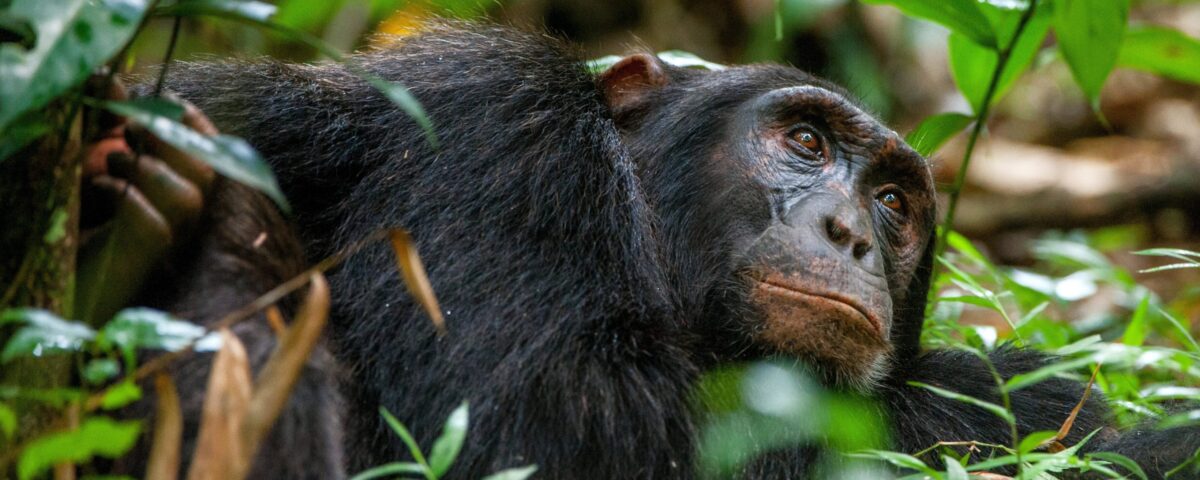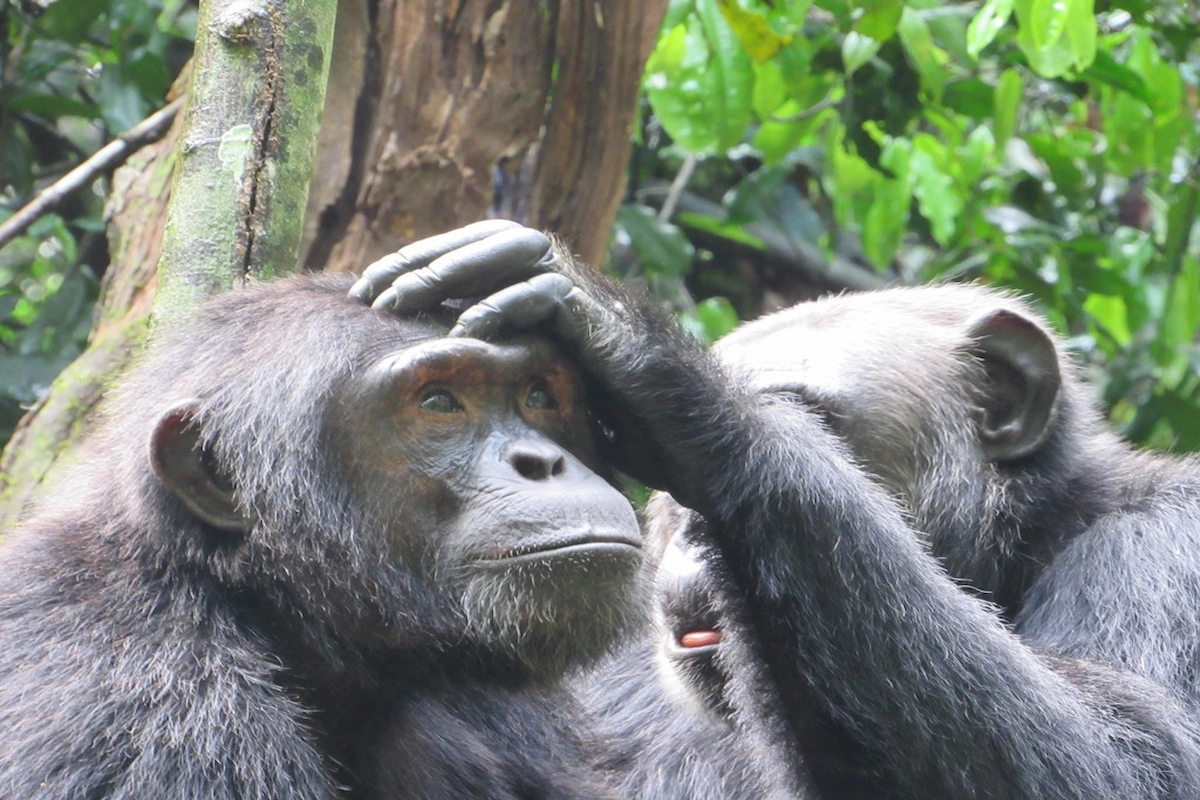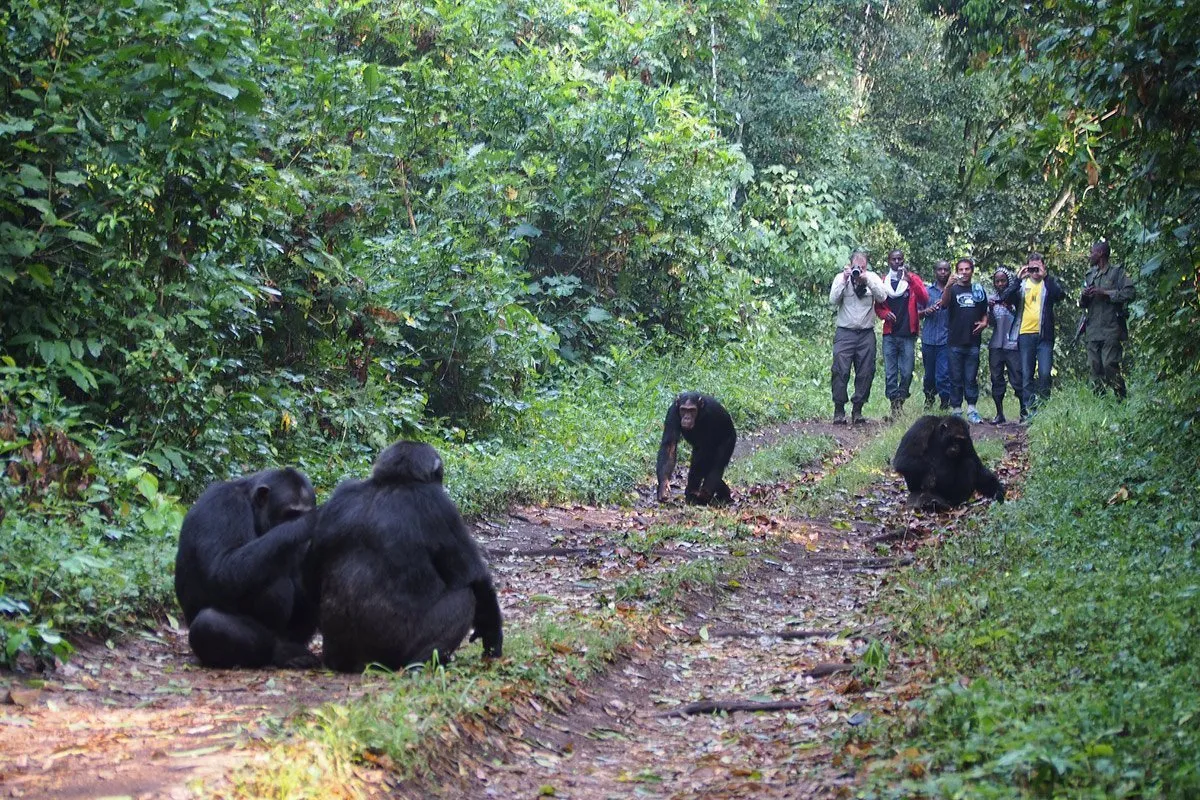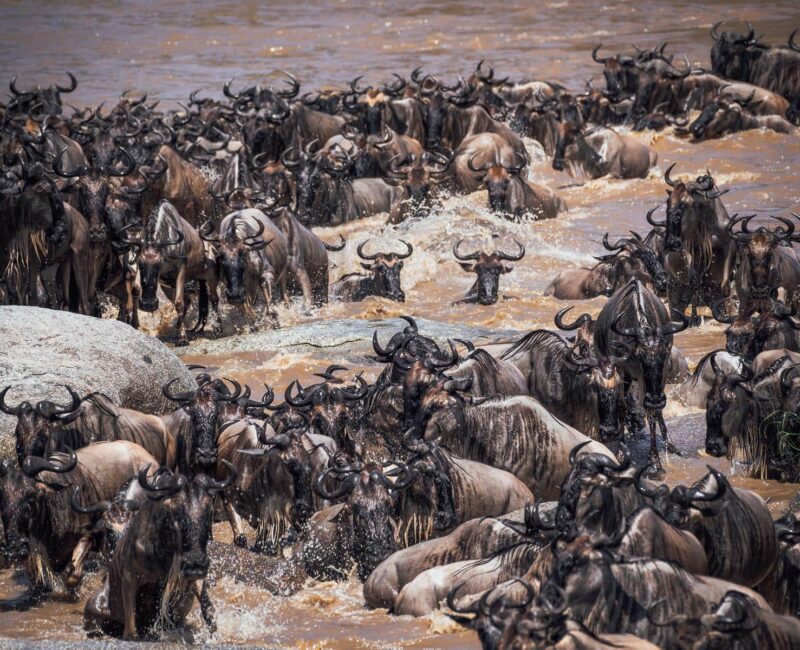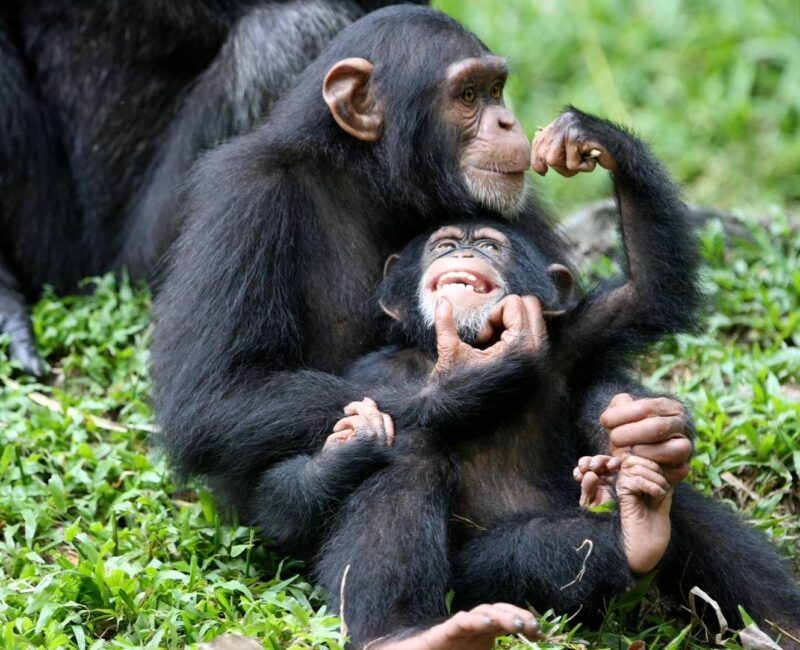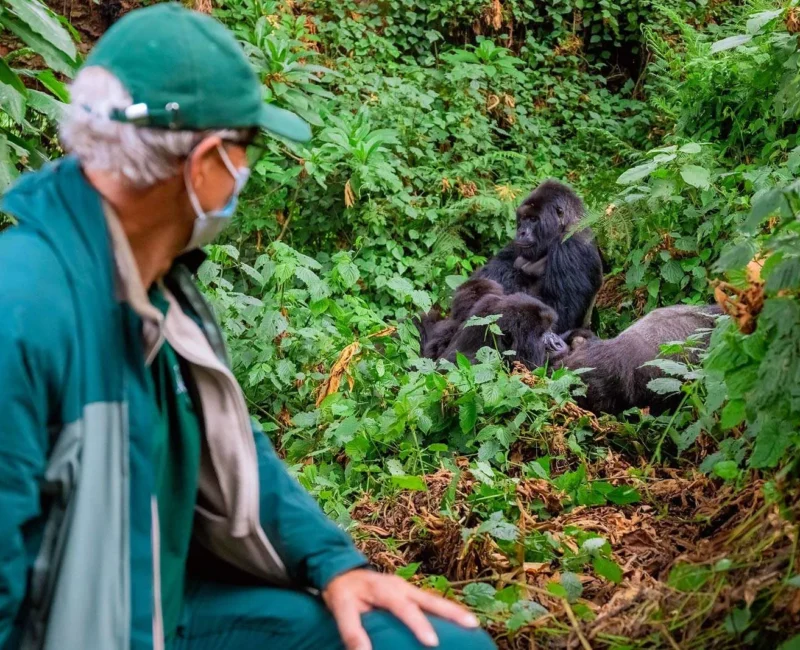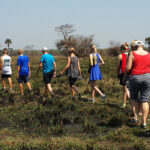
Do I Need Special Permits for a Walking Safari in Uganda?
September 30, 2025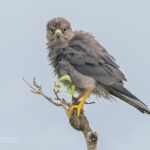
Do I Need Special Permits for Birding in Uganda?
September 30, 2025Do I Need to Be Fit for Chimpanzee Tracking in Uganda?
Do I need to be fit for chimpanzee tracking in Uganda? This is one of the most common questions asked by travelers preparing for Uganda Chimpanzee Safaris. Chimpanzee tracking is an exhilarating wildlife adventure, offering close encounters with one of our closest primate relatives in their natural rainforest habitat. Uganda, with its lush forests, diverse wildlife, and well-managed national parks, provides world-class chimpanzee tracking experiences in locations such as Kyambura Gorge, Kibale National Park, and Budongo Forest.
Introduction: Understanding the Physical Requirements of Chimpanzee Tracking
Fitness is an important consideration because chimpanzee tracking involves trekking through dense forests, steep slopes, and occasionally muddy or uneven terrain. The intensity of the trek depends on the location of the chimpanzee groups on any given day, as they move freely within their territories. Travelers often combine chimpanzee tracking with Uganda Gorilla Trekking Safaris, Uganda Wildlife Safaris, and Uganda Birding Safaris, making physical preparation a key factor in maximizing enjoyment and safety. EcoQuest Safaris provides expert guidance and support to help visitors of varying fitness levels successfully complete these treks, ensuring an unforgettable wildlife experience that also includes educational insights into primate behavior, forest ecology, and conservation.
Answering the question, “Do I need to be fit for chimpanzee tracking in Uganda?” highlights the importance of preparation, stamina, and realistic expectations. With professional guides, well-planned itineraries, and optional easier routes, travelers can enjoy Uganda Best Safaris regardless of fitness level. Moreover, combining chimpanzee tracking with cultural encounters, birding, or gorilla trekking enriches the safari experience, demonstrating that Uganda offers accessible adventure opportunities for a wide range of travelers.
The Physical Demands of Chimpanzee Tracking
Do I need to be fit for chimpanzee tracking in Uganda? Absolutely, understanding the physical requirements helps travelers prepare effectively. A typical chimpanzee tracking excursion involves trekking for several hours through forested terrain with dense undergrowth, streams, and steep inclines. In Kibale National Park, where chimpanzee tracking is most popular, daily treks range from 2 to 6 hours depending on the chimpanzees’ location and activity. The forest trails can be slippery during wet seasons, requiring balance, careful footing, and moderate endurance.
EcoQuest Safaris emphasizes that trekking difficulty varies by park and group location. Kyambura Gorge, for example, offers shorter, less strenuous trails, making it accessible to travelers who may not be in peak physical condition, whereas Budongo Forest may require longer walks over uneven terrain. The fitness requirement also depends on the traveler’s personal goals—some may prefer a brisk trek for early sightings, while others enjoy a slower pace, stopping to observe birds, smaller mammals, or forest flora along the way.
Fitness preparation enhances both safety and enjoyment. Travelers should consider cardiovascular conditioning, leg strength, and flexibility to navigate forest trails comfortably. Walking on varied terrain and climbing moderate slopes mimics the movements required in chimpanzee tracking. EcoQuest Safaris ensures that guides adjust the pace and offer support, including trekking poles or designated rest points, allowing participants to complete Uganda Chimpanzee Safaris successfully and safely. The question of fitness is therefore not a barrier but a consideration for optimizing the safari experience.
Who Can Participate in Chimpanzee Tracking?
Do I need to be fit for chimpanzee tracking in Uganda? The short answer is yes, but the good news is that chimpanzee tracking is accessible to a wide range of travelers. Parks such as Kyambura Gorge and certain areas in Kibale National Park provide shorter and less physically demanding routes, making the experience suitable for families, older adults, and moderately active individuals. Guided treks are carefully structured to accommodate different fitness levels while ensuring safety and an immersive wildlife experience.
EcoQuest Safaris designs itineraries to ensure that participants are adequately briefed before the trek, including guidance on proper footwear, hydration, pacing, and trail etiquette. For those seeking a more relaxed safari experience, options include combining chimpanzee tracking with cultural visits to nearby villages, birdwatching, or Uganda Wildlife Safaris, creating a well-rounded itinerary that balances physical activity with observation and education.
Combining chimpanzee tracking with Uganda Gorilla Trekking Safaris also allows travelers to progressively build fitness. Gorilla trekking can be more physically demanding due to steep forest terrain and higher altitudes. EcoQuest Safaris provides expert guidance on how to prepare for multi-park primate treks, including stretching exercises, light hikes, and nutrition tips to ensure stamina. Answering the question of who can participate emphasizes that, with planning and professional support, Uganda Best Safaris are accessible to a broad audience while maintaining the integrity and adventure of the wildlife experience.
Preparing Physically for Chimpanzee Tracking
Do I need to be fit for chimpanzee tracking in Uganda? Yes, and preparation is key to ensuring a safe and enjoyable trek. Physical readiness for chimpanzee tracking involves both endurance and strength. Cardiovascular exercises such as walking, jogging, or cycling improve stamina, while leg-strengthening exercises, including squats and lunges, support trekking over uneven terrain. Flexibility exercises enhance balance on slippery or uneven forest trails.
EcoQuest Safaris provides detailed guidance on how to prepare for Uganda Chimpanzee Safaris, including tips for adjusting to altitude, wearing appropriate clothing, and staying hydrated during long treks. Participants are encouraged to carry light backpacks with essentials like water, snacks, insect repellent, and rain gear. Proper footwear, such as sturdy hiking boots with ankle support, is crucial for comfort and safety.
Preparation also includes mental readiness. Chimpanzee tracking requires patience and observation, as primates move unpredictably and sightings are not guaranteed at a fixed time. EcoQuest Safaris ensures that guests understand these dynamics while offering optional shorter treks for those with moderate fitness, as well as longer treks for more adventurous travelers. Answering the question of fitness emphasizes that preparation and realistic expectations allow anyone to enjoy Uganda Best Safaris safely, making the experience both memorable and educational.
Seasonal Considerations and Fitness Requirements
Do I need to be fit for chimpanzee tracking in Uganda? Seasonal conditions influence the physical demands of the trek. During the wet seasons, from March to May and October to November, trails become slippery and muddy, increasing the effort required to navigate forest paths. Dry seasons, from June to September and December to February, offer more stable terrain but may require longer walks to reach chimpanzee groups as vegetation is less dense and food sources are more dispersed.
EcoQuest Safaris provides customized advice based on the season, including equipment suggestions such as trekking poles for wet-season hikes or lightweight hydration packs for dry-season treks. Guides adjust the pace of the trek to suit participants’ fitness levels while maximizing opportunities for wildlife and bird observation. Seasonal planning also allows travelers to combine chimpanzee tracking with Uganda Birding Safaris, as different species may be more visible or active depending on the season, enriching the overall safari experience.
By considering seasonal conditions, travelers can prepare effectively for the trek, ensuring that physical fitness, equipment, and pacing are appropriate. This professional guidance enhances safety and enjoyment, reinforcing EcoQuest Safaris’ authority and expertise in providing immersive and flexible Uganda Chimpanzee Safaris and multi-activity itineraries.
Combining Chimpanzee Tracking with Gorilla Trekking
Do I need to be fit for chimpanzee tracking in Uganda and still combine it with gorilla trekking? Yes, and this combination is highly rewarding for travelers seeking a complete primate experience. While chimpanzee tracking offers moderate physical activity through forest trails, Uganda Gorilla Trekking Safaris in Bwindi Impenetrable Forest or Mgahinga Gorilla National Park can be more physically demanding due to steeper slopes, higher altitudes, and denser vegetation.
EcoQuest Safaris designs itineraries that allow travelers to gradually build stamina. For example, a morning chimpanzee trek in Kyambura Gorge followed by a short afternoon game drive or birding activity can prepare participants for more intense gorilla trekking the next day. This integrated approach ensures that participants experience both types of primate tracking without compromising safety or enjoyment. Guides provide pacing strategies, rest points, and motivational support, making it possible for travelers of moderate fitness to participate in multi-day primate safaris successfully.
Combining chimpanzee tracking with gorilla trekking also enhances the educational and conservation value of the safari. Travelers gain insights into primate behavior, forest ecology, and ongoing conservation initiatives. This comprehensive approach reinforces Uganda’s reputation for immersive, world-class wildlife experiences and establishes EcoQuest Safaris as a trusted provider of Uganda Gorilla Safaris, Uganda Chimpanzee Safaris, and multi-activity safaris.
Cultural Experiences During Chimpanzee Safaris
Do I need to be fit for chimpanzee tracking in Uganda and still enjoy cultural experiences? Absolutely. Many chimpanzee trekking locations are near local communities, offering opportunities for visitors to explore Uganda’s rich cultural heritage. Travelers can visit villages, participate in traditional dances, learn about local farming practices, or observe artisanal crafts. These experiences complement the physical activity of tracking and provide a more holistic view of Uganda’s landscape and people.
EcoQuest Safaris integrates cultural experiences into Uganda Chimpanzee Safaris, ensuring that guests enjoy both adventure and education. Walking through forests and interacting with local communities allows travelers to understand how humans and wildlife coexist, emphasizing conservation and sustainability. Cultural immersion also provides rest periods between physically demanding treks, making the safari more balanced and accessible to those who may not be in peak physical condition.
By combining physical activity, wildlife observation, and cultural engagement, EcoQuest Safaris offers a multi-layered experience that answers the question—“Do I need to be fit for chimpanzee tracking in Uganda?”—while showcasing the full range of Uganda Best Safaris. This approach ensures every guest enjoys a safe, immersive, and memorable safari.
Conclusion: Fitness and Chimpanzee Tracking Success
Do I need to be fit for chimpanzee tracking in Uganda? Yes, to a degree, but with proper preparation, professional guidance, and well-planned itineraries, travelers of varying fitness levels can successfully participate in Uganda Chimpanzee Safaris. Combining chimpanzee tracking with Uganda Gorilla Trekking Safaris, birding, and cultural experiences creates a rich, multi-dimensional safari that balances adventure, learning, and relaxation.
EcoQuest Safaris emphasizes preparation, support, and flexibility, ensuring that every guest enjoys a safe and rewarding experience. Physical fitness enhances the ability to navigate forest trails, but motivation, guidance, and pacing are equally important. By addressing fitness needs and offering integrated safari experiences, EcoQuest Safaris establishes itself as a reliable authority in the African tourism industry, providing world-class Uganda Wildlife Safaris, Uganda Birding Safaris, and Uganda Cultural Safaris.
Chimpanzee tracking in Uganda offers unforgettable encounters with one of the world’s most fascinating primates, and preparation ensures that every moment is maximized for enjoyment, education, and conservation awareness. Answering the question—“Do I need to be fit for chimpanzee tracking in Uganda?”—demonstrates that with proper guidance, equipment, and planning, these iconic Uganda Best Safaris are accessible, safe, and life-changing for travelers worldwide.

